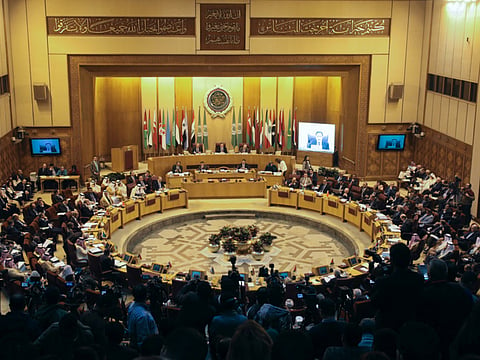The choice is not between Israel and Iran
Arab states can and must forge their own independent future

In a titillating essay published by the Atlantic Council in Washington, DC, an Iranian graduate student at the American University’s School of International Service and a Project Assistant at the Council’s ‘Future of Iran Initiative, invites “Arab States of the Persian Gulf [to] Choose Between Paths Proposed by Iran and Israel”.
Mehran Haghirian aims to provoke when he suggests that “two very different dialogue proposals are on the table for the Arab states of the Persian Gulf [he uses the term 10 times in the essay without realising its consequences], one from a historic enemy, Israel, proposed in conjunction with a crucial partner, the United States. The other is from a historic rival, Iran, which shares the same neighbourhood and faith. The choice the Arab countries ultimately make could determine the future peace and prosperity of the region”, he asserts.
There are, undoubtedly, elements of truths in these words though there are also organised errors. To be sure, Israel is a usurper of land and its enmity is primarily with the Palestinians, not necessarily every single living Arab or Muslim, while Iran is much more than a mere rival. The first is and will always be a cultural outsider to the Arab world whereas the second is an existential challenger — both along cultural and religious dimensions.
Over the long-term, Israelis have little choice but to come to terms with Palestinians, even if the process is unnecessarily wasteful and painful, while Iranians must acknowledge that their neighbourly presence does not accord them interference privileges. Both Israel and Iran, which maintained exceptionally close ties under the Shah and the mullahs alike, ought to finally realise that imposing their respective wills on Arabs is futile. It was the case in the past, it is so today, and will remain thus in the future.
Mutual concerns
Undeterred by reality, our haughty analyst lists various ideas to buttress his thesis, focusing on the recent Munich Security Conference presentation by the Iranian Foreign Minister, Mohammad Javad Zarif, who reiterated his country’s oft-repeated calls for regional dialogue. He contrasts the Zarif motion, presumably one whose primary goal is to decrease tensions and increase cooperation among neighbours, with a putative American-Israeli proposal whose principal objective is a wider Arab-Israeli peace agreement that will end the Israeli-Palestinian conflict. Haghirian further contends that “the key selling point behind this initiative is mutual concerns regarding Iran, and the proposal has a goal to present a unified front against the Islamic republic”, allegedly because Gulf Cooperation Council (GCC) states were onboard. Paradoxically, our intrepid researcher affirms that “secret direct interactions between high-level Israeli and GCC officials have indeed taken place in the past six years — if not longer”, though he overlooks the fact that it was the Barack Obama administration, along with its global partners, that signed a nuclear agreement with Iran in 2015 — against GCC interests
Somehow, the very close ties between Israel and Iran, discussed by Trita Parsi in his Treacherous Alliance: The Secret Dealings of Israel, Iran and the United States, are forgotten, though Parsi, the founder and current president of the National Iranian American Council, is honest to acknowledge that strategic imperatives compelled Ayatollah Ruhollah Khomeini to maintain clandestine ties with Israel, contacts that were further strengthened during the Iran-Iraq War when American weapons and spare parts were purchased via Israel.
Of course, while it is true that President Mah-moud Ahmadinejad upped his unique rhetorical skills to “wipe Israel off the map”, and despite Iranian funding of Arab militias like Hezbollah in Lebanon and Hamas in Palestine, among others, in reality, what Israel backed was the very idea of minority rule. In other words, and unlike what Haghirian assumes, Israel has not seen, and does not perceive, “Iran as its major adversary because of Iran’s support for Hamas and Hezbollah as well as Iran’s ballistic missile programme and nuclear advances”. On the contrary, as a minority nation itself, Israel prefers to align itself with other minority nations, ranging the gamut — Shiites, Christians, Druzes, Yazidis, Alawis, Houthis and many others.
Stopping the pretences
As the Saudi Foreign Minister Adel Al Jubeir underscored at the same Munich Security Conference a few weeks ago, Iran ought to concentrate on its own internal affairs and end its massive interferences in Arab affairs.
It could stop pretending that it is merely exercising influence in Iraq, Syria, Lebanon, Yemen, Bahrain and elsewhere. It could end its hijacking the Palestine Question on the pretext that it is a Muslim cause.
It might also be a good idea to consider stopping claims that the Persian Empire is restored, that its capital be in Baghdad, and that Iran now controls four Arab capitals (Baghdad, Beirut, Damascus and Sana’a).
Such efforts might reduce long-standing hostilities between Arabs and Persians, which outsiders would then no longer be in a position to exploit. Let’s face it, Persians and Arabs are not “brothers” but neighbours and as such ought to maintain the best of relations. Beyond mutual respect, the best way to avoid conflict is not to choose between Israel and Iran, but to forge policies that advance Arab interests.
Dr Joseph Kechichian is the author of the just published The Attempt to Uproot Sunni Arab Influence: A Geo-Strategic Analysis of the Western, Israeli and Iranian Quest for Domination (Sussex: 2017).
Sign up for the Daily Briefing
Get the latest news and updates straight to your inbox



